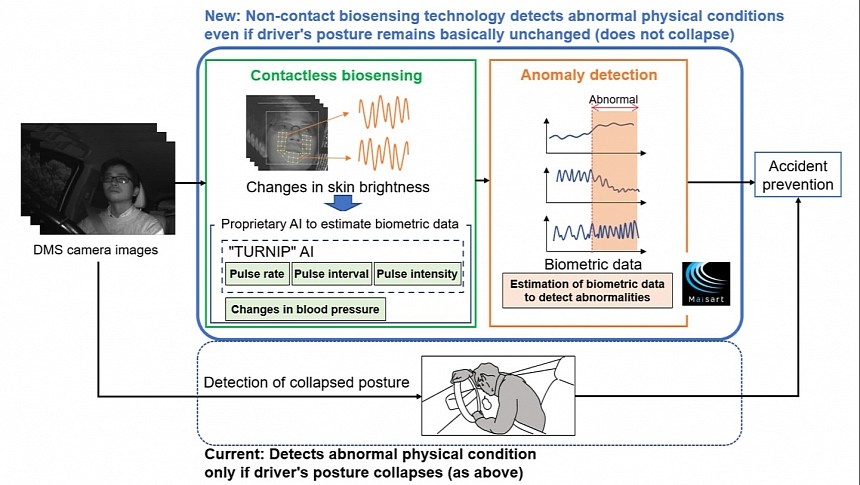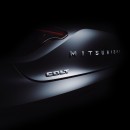Systems to monitor driver physical conditions have been around for a while, but Mitsubishi has created what’s likely the most advanced contactless solution.
The Japanese carmaker uses the vehicles' Driver Monitoring System (DMS) camera to collect biometric data. The camera looks for certain triggers that could indicate serious physical conditions, such as loss of consciousness, and then relies on artificial intelligence to process the data.
DMS cameras are already installed in cars, but Mitsubishi says they can do so much more with the right technology. In theory, their purpose is to detect driver distraction and drowsiness.
The Japanese carmaker discovered that the data it collects could be processed by the company’s AI system to estimate biometric readings. For example, the algorithms can estimate the pulse rate and the changes in blood pressure. Such readings are critical for the detection of physical conditions, and Mitsubishi says they could help determine sudden illness.
Rapid changes in blood pressure and heart rate could be early signs of serious diseases, such as epilepsy and heart affection. The carmaker believes that by monitoring the physical conditions experienced by drivers, the vehicle could eventually take swift action and activate safety systems to prevent crashes.
The existing detection systems monitor the driver's posture to determine when serious physical conditions occur. However, Mitsubishi says the main shortcoming is precisely their detection methods. Drivers who lose consciousness don’t change their posture in 50 percent of the cases, especially when wearing a seatbelt. As such, these systems could fail to detect the change, eventually being unable to activate the safety equipment and react accordingly.
This is why contactless biosensing can make such a huge difference. In theory, Mitsubishi’s system should be able to detect changes in skin brightness, and then, using proprietary AI, it can estimate biometric data. This includes changes in blood pressure and pulse readings, such as rate, interval, and intensity.
Depending on the estimated data, Mitsubishi’s technology can activate an accident prevention system. The purpose is to bring the vehicle to a halt specifically to avoid collisions with other cars on the road after the driver loses consciousness.
The company doesn’t say anything about the models that could get the new capabilities. However, Mitsubishi says this would happen “in the future,” possibly as it needs more time to fine-tune the contactless readings and reduce the false positives.
In the long term, the carmaker’s concept could help address one of the most common causes of car accidents. The Japanese company explains that heart disease, epilepsy, and cerebrovascular affections are among the top medical causes of fatal collisions. In theory, all three can be detected with the contactless system, especially as the focus is on physical changes experienced by the driver.
DMS cameras are already installed in cars, but Mitsubishi says they can do so much more with the right technology. In theory, their purpose is to detect driver distraction and drowsiness.
The Japanese carmaker discovered that the data it collects could be processed by the company’s AI system to estimate biometric readings. For example, the algorithms can estimate the pulse rate and the changes in blood pressure. Such readings are critical for the detection of physical conditions, and Mitsubishi says they could help determine sudden illness.
Rapid changes in blood pressure and heart rate could be early signs of serious diseases, such as epilepsy and heart affection. The carmaker believes that by monitoring the physical conditions experienced by drivers, the vehicle could eventually take swift action and activate safety systems to prevent crashes.
The existing detection systems monitor the driver's posture to determine when serious physical conditions occur. However, Mitsubishi says the main shortcoming is precisely their detection methods. Drivers who lose consciousness don’t change their posture in 50 percent of the cases, especially when wearing a seatbelt. As such, these systems could fail to detect the change, eventually being unable to activate the safety equipment and react accordingly.
This is why contactless biosensing can make such a huge difference. In theory, Mitsubishi’s system should be able to detect changes in skin brightness, and then, using proprietary AI, it can estimate biometric data. This includes changes in blood pressure and pulse readings, such as rate, interval, and intensity.
Depending on the estimated data, Mitsubishi’s technology can activate an accident prevention system. The purpose is to bring the vehicle to a halt specifically to avoid collisions with other cars on the road after the driver loses consciousness.
The company doesn’t say anything about the models that could get the new capabilities. However, Mitsubishi says this would happen “in the future,” possibly as it needs more time to fine-tune the contactless readings and reduce the false positives.
In the long term, the carmaker’s concept could help address one of the most common causes of car accidents. The Japanese company explains that heart disease, epilepsy, and cerebrovascular affections are among the top medical causes of fatal collisions. In theory, all three can be detected with the contactless system, especially as the focus is on physical changes experienced by the driver.





